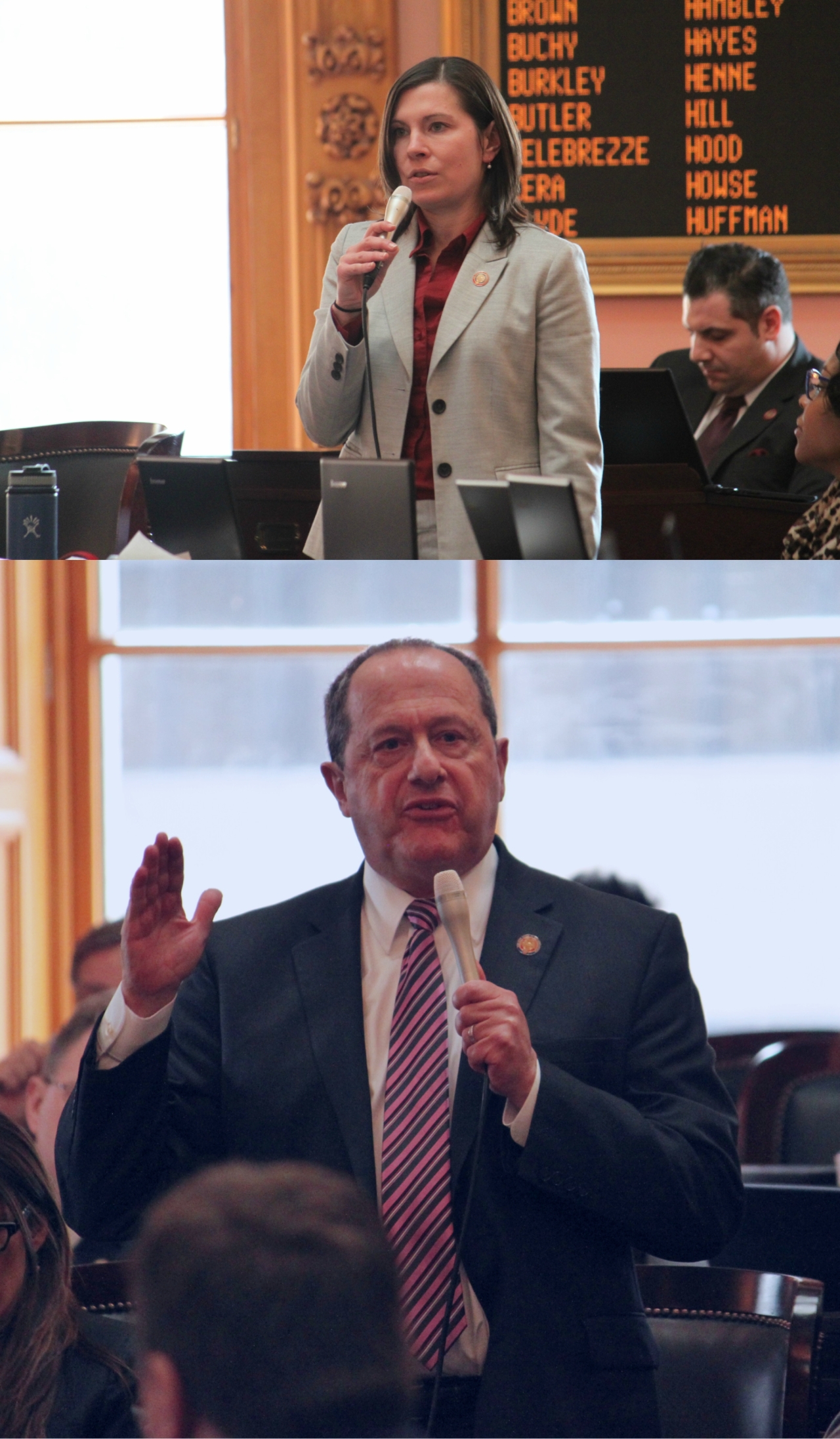Democratic News
Featured Stories
News Feed
State Reps. Kent Smith (D-Euclid) and Sarah LaTourette (R-Chesterland) gave sponsor testimony before the House Ways and Means Committee Tuesday on a bi-partisan effort to create jobs and drive economic growth by making Ohio a destination for the recording industry. The Ohio Sound Recording Investor Tax Credit, also known as OhioSounds, will work to attract more of the almost $7 billion in annual music industry revenue to the state.
“While other states, like Georgia which just signed their program into law on May 8, are also pushing for recording studio incentives, I believe Ohio should get ahead of the curve in attracting new music recording projects as well as growing our existing studios and musical talent,” said Rep. Smith. “OhioSounds builds upon our proud music history and works to cultivate our state’s musical legacy moving forward.”
State Rep. Kathleen Clyde (D-Kent) testified today on House Bill 93, the Tax Returns Uniformly Made Public (TRUMP) Act in its first hearing in the Ohio House Federalism and Interstate Relations Committee. The TRUMP Act would require presidential and vice presidential candidates to release their five most recent years of tax returns to qualify for the Ohio ballot.
“I am encouraged that the TRUMP Act is moving forward,” said Rep. Clyde. “I urge the committee to continue to hold hearings on this important legislation so that the American people know those vying for our highest offices are honest, accountable and acting in the best interest of our nation.”
Rep. Clyde’s full testimony is below:

State Rep. Kathleen Clyde (D-Kent) will testify on House Bill 93, the Tax Returns Uniformly Made Public (TRUMP) Act in its first hearing in the Ohio House Federalism and Interstate Relations Committee, TODAY, Tuesday, May 2 at 4:00 p.m. in Statehouse room 115.
The TRUMP Act would require presidential and vice presidential candidates to release their five most recent years of tax returns to qualify for the Ohio ballot.
WHO: State Rep. Kathleen Clyde (D-Kent)
WHAT: Testimony on the TRUMP Act
WHEN: TODAY, Tuesday, May 9 at 4:00 p.m.
WHERE: House Federalism and Interstate Relations Committee
Ohio Statehouse room 115
State Rep. Jack Cera (D-Bellaire), the lead Democratic member on the House budget committee, voted “no” on the House version of the state budget Tuesday, expressing concern the budget was unbalanced and fiscally irresponsible.
“The state has responsibility to balance the budget and pay its bills, just like the families and people in our community,” said Cera. “Not only is that responsibility important to the economic stability of the working people and families of our state, but it’s required under our constitution. This isn’t Washington.”

Ohio House Democratic Leader Fred Strahorn (D-Dayton) released the following statement in response to the Republican passage of Trumpcare in the U.S. House of Representatives by a razor thin margin today:
“Republicans are playing a dangerous game with the health, safety, and economic stability of millions of Americans and almost one-million Ohio families and children. Rolling back the Affordable Care Act takes us backwards to a darker time in our nation, when people who were sick with diseases like diabetes and cancer couldn’t get the lifesaving care they needed without going bankrupt or gambling their family’s financial future. Today’s vote puts more stress on millions of families across America. We can only hope cooler heads prevail, and the Senate does right by the American people instead of a political party.”
The non-partisan Congressional Budget Office has yet to fully analyze the latest version of Trumpcare, but healthcare experts expect it to be similar to the previous version of the bill, under which 24 million Americans had little or no access to affordable healthcare. Under that version, Ohio also lost some $26 billion in federal healthcare funding, while one out of four Ohioans would have seen reduced healthcare eligibility and services. Costs also skyrocketed for the average Ohio enrollee by nearly $3,000, and by over $5,000 fo
Following Tuesday’s House passage of an unbalanced two-year state budget bill, the Kasich Administration today released the latest tax revenues for the current fiscal year, showing Ohio’s stumbling economy resulted in a nearly $160 million shortfall for April 2017 alone.
Ohio’s fiscal shortfall during the course of one year now climbs to negative $1.057 billion under GOP leadership. Today’s revenue returns suggest a serious financial problem for the state now, even before the upcoming state budget is finalized in June.
“Ohioans are looking to their elected leaders in Columbus to confront the greatest challenges facing our state – the opioid addiction crisis claiming thousands of lives each year, an unconstitutional funding model for our public schools, rising infant mortality and falling wages – but the state cannot afford to make meaningful progress to grow the middle class after years of tax-shifting have blown a hole in our fiscal future,” said House Democratic Leader Fred Strahorn (D-Dayton).
Before new state economic indicators come out Thursday, the Ohio House today passed a version of the state’s two-year budget, House Bill (HB) 49, that remains hundreds of millions of dollars out of balance, if not more. The vote comes a little more than two weeks after Gov. Kasich and GOP legislative leaders announced they would need to cut close to $1 billion from the bill to maintain a stable, balanced budget. Still, the final version of House Bill 49 approved largely along party lines today fell over $400 million short of being a balanced budget bill by that standard.
“The inability to adequately invest in Ohio’s future due to vanishing revenues is a direct result of six years of failed GOP economic policies that shifted taxes onto local communities and middle-class families,” said House Democratic Leader Fred Strahorn (D-Dayton). “Republicans promised that tax cuts for the wealthy would deliver a thriving economy and vibrant communities, and yet Ohio has trailed the nation in job growth for fifty-one consecutive months, families bring home less income than the national average, and Ohio leads the nation in opioid overdose deaths. Just hitting the brakes on tax-shifting in this budget is not enough to stop Ohio from falling over the fiscal cliff. We need a real plan that reverses the failed economic policies of the past and focuses the future so the next generation of working people can have economic stability and a clear path to the middle class in our state.”
Ohio House Democratic Leader Fred Strahorn (D-Dayton) and the Democratic lead on the House budget panel, state Rep. Jack Cera (D-Bellaire), today released the following joint response regarding the House changes to Gov. Kasich’s proposed two-year state operating budget, House Bill 49:
“With the House’s revised budget, we were able to press pause on six years of Republican tax shifting that forces the middle class and working people to pay more for giveaways to the top one-percent. Through public pressure and awareness, we were also able to get Republicans to bring more resources to the statewide fight against heroin and opioids. But the simple fact is, the state is in trouble today because of the GOP’s failed economic policies of the last six years."
State Rep. Jack Cera (D-Bellaire) today announced the House Democratic screening panel tasked with finding a replacement for the 35th House district seat, previously held by Greta Johnson (D-Akron), has recommended Tavia Galonski to fill the remainder of Johnson’s term.
The panel recommended Galonski after interviewing eight applicants for the 35th House district seat.
“Among the many qualified applicants, Tavia’s leadership and experience make her the best possible representative for the thirty-fifth district,” said Cera. “We are confident constituents will have a real advocate for their future in Mrs. Galonski.”

State Reps. David Leland (D-Columbus) and Kristin Boggs (D-Columbus) testified Tuesday during Energy and Natural Resources Committee in the Statehouse on House Bill 29, their legislation to prevent the destruction of natural buffer zones growing around municipally owned drinking-water reservoirs throughout Ohio.
The Columbus lawmakers’ legislation will repeal a provision surreptitiously included in the state’s last biennial budget that allowed residents to significantly alter those zones.
“This provision, which was inserted into the previous State Budget at the last minute without public input or participation, is a potential threat to the health and safety of residents throughout Ohio,” said Leland. “Our reservoirs are a vital source of public water for Columbus and other cities, and the strips of land encircling these reservoirs act as a natural filter that removes contaminants that would threaten our water supply. Given the drinking water issues Ohio has faced in the last couple of years, we should be doing more to protect our drinking water, not less."
“It is of the utmost importance to protect our water supply and ensure that it remains clean and safe for our community to drink." Boggs said. "It is simply bad policy to give a few people the power, without any oversight, to alter landscape in a way that could have a negative impact on our water quality."







